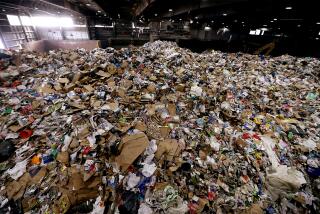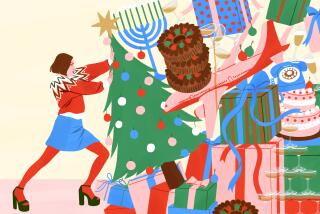The season of excess begins
- Share via
Some celebrate Christmas, some Hanukkah and some Kwanzaa, but to me the coming holiday time is potlatch season, and it’s starting earlier every year.
A potlatch was a festival of the indigenous peoples of the Pacific Northwest during which the host distributed property and gifts as a way to demonstrate wealth, generosity and social standing. Guests would reciprocate at a later time with items that matched or exceeded the value of the original gifts, or risk being humiliated.
Although births and marriages were sometimes acknowledged at a potlatch, the main purpose was the reciprocal redistribution of wealth. The more one gave away, the greater one’s power. In some tribes’ celebrations, the goods were destroyed, in what might be called the ultimate act of conspicuous consumption.
In the late 1800s, Canada and the United States banned potlatch ceremonies at the urging of Christian missionaries and government agents, who saw the custom as wasteful, unproductive and contrary to civilized values. These bans were clearly discriminatory, but were also a way of assimilating the native peoples into Western traditions of displaying power by accumulating and keeping wealth rather than by giving it away. The potlatch bans were eventually repealed.
Fast-forward 125 years, and one wonders whether modern American society has adopted the potlatch traditions. As “Black Friday” morphs in one direction to interfere with the celebration of Thanksgiving and in the other toward Cyber Monday, people continue to buy one another things just because they “have to get someone a gift,” even if it may be re-gifted, returned or never used. Our society’s barely restrained annual celebration of blatant commercialism approaches the seemingly needless exchanges and even destructiveness of the potlatch.
Judging from news reports and holiday sales that began before kids were done trick-or-treating, retailers are very concerned that business will be down from last year. They have reason to be concerned. Aside from the shorter shopping period between Thanksgiving and Christmas, the economy is still a shambles, the economic impact of Obamacare is unclear and there are no really “must have” consumer electronics, books or toys.
Unfortunately, in these hard economic times, when jobs are still scarce, there is great need and even food insecurity, especially among younger people and families with children. But in most parts of middle- and upper-class Southern California, nobody appears to need much more than what they already have.
My wife says that if everyone thought as I do, the economy would be in even worse shape. She’s probably right. The malls would be emptier and business would be down for sweatshops in China, unsafe factories in Bangladesh and makers of gift cards and wrap. But here in the Los Angeles area, cars are parked in driveways or on the street because garages are full of stuff. And when Angelenos run out of space there, they rent storage lockers, where from time to time they visit their extra things.
Maybe this year, we can work toward ending the potlatch season. Let’s stop buying and giving things people don’t want and don’t need.
If you feel a need to give, give food to the hungry, clothes and toys to those in need, or donations to victims of storms, violence or conflict. A plate of homemade cookies or some other delicacy delivered personally is a much better way to remember friends and family than a meaningless generic gift, a “dustable” to sit on the shelf or yet another ill-fitting sweater in the wrong color. And most older people need even fewer things. Unfortunately, what they really want — youth, vigor, health — are things we can’t give them. But they, and I’m sure many others, would appreciate a call, a card or a visit from family, neighbors and friends. So will you.
Daniel Fink lives in the Los Angeles area.
More to Read
A cure for the common opinion
Get thought-provoking perspectives with our weekly newsletter.
You may occasionally receive promotional content from the Los Angeles Times.









